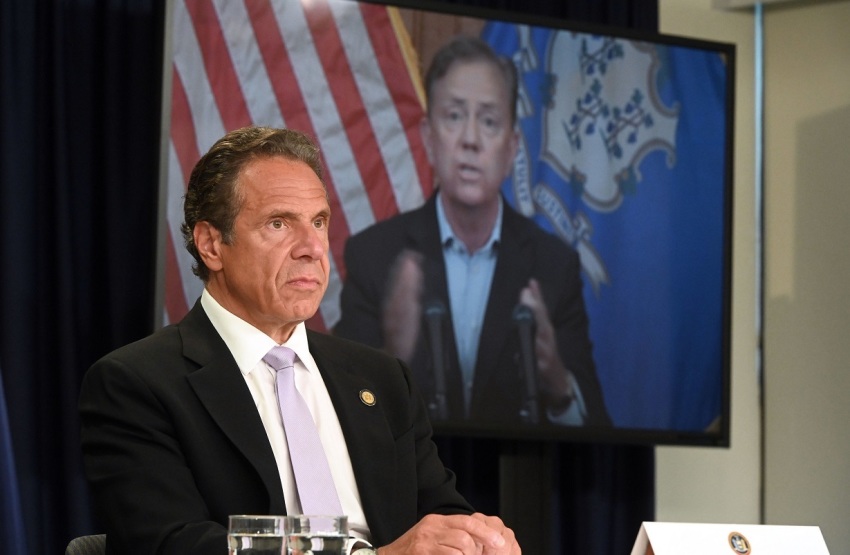Supreme Court ruling favoring churches is 'statement' on new conservative bent: Andrew Cuomo

New York Gov. Andrew Cuomo called Wednesday’s Supreme Court ruling favoring religious organizations in a dispute over COVID-19 restrictions, “irrelevant” and not “final” while arguing that the decision is really more of a statement on the court’s new conservative bent.
“They wanted to make a statement that it's a different court. That's the statement they're making, I understand that. And that’s to be expected," Cuomo said during a Thanksgiving Day call, alluding to the impact of the recent addition of Justice Amy Coney Barrett on the bench without calling her by name.
“We know who we appointed to the court. We know their ideology. It’s irrelevant from a practical impact because the zone that they were talking about has already been moved. It expired last week. I think this was really just an opportunity for the court to express its philosophy and politics,” he said.
In a 5-4 ruling Wednesday the high court temporarily blocked New York’s COVID-19 restrictions on houses of worship, arguing that they “strike at the very heart of the First Amendment’s guarantee of religious liberty.”
The court said that the Roman Catholic Diocese of Brooklyn and Agudath Israel of America are likely to succeed in their arguments that the restrictions violate the Free Exercise Clause of the First Amendment and that they would cause irreparable harm. The groups had sued Cuomo over his executive order limiting worship gatherings to 10 people for those in red zones and 25 for those in orange zones.
Cuomo argued on Thursday that the dispute isn’t settled.
“The decision isn’t final in the first place right. It goes back to the Second Circuit Appeals Court so it’s not even a final legal position. Second, it didn’t affect our mass gathering rules that 25%, 33 etc. So it didn’t mention those. It didn’t mention the overall limits. I think the basic point is you know why does the court rule on an issue that is moot unless — and which they had just decided several months before in other cases which presented the same argument — why rule on a case that is moot and come up with a different decision than you did several months ago on the same issue? You have a different court and I think that was the statement that the court was making," he argued.
He further noted that while he values the role of the church in society, there is also a need to protect public health amid the pandemic.
“In terms of religious gatherings, look, I'm a former altar boy. Catholic grammar school, Catholic high school, Jesuit college. So I fully respect religion and if there's a time in life when we need it, the time is now, but we want to make sure we keep people safe at the same time. That's the balance we're trying to hit, especially through this holiday season and the coming Christmas, Hanukkah, Kwanza, etc. celebrations,” he said.
In support of the court’s decision, Justice Neil Gorsuch noted that religious groups are treated differently from secular entities. He wrote in his opinion: “It is time – past time – to make plain that, while the pandemic poses many grave challenges, there is no world in which the Constitution tolerates color-coded executive edicts that reopen liquor stores and bike shops but shutter churches, synagogues, and mosques.”
The Thomas More Society, which has been fighting COVID-19 restrictions on religion across the nation, including the ongoing lawsuit against Cuomo on behalf of Catholic and Orthodox Jewish worshipers, praised the recent Supreme Court decision.
“The Supreme Court has made it clear that governors can no longer use a public health emergency as a pretext for dictates shutting or severely restricting the use of houses of worship while secular businesses and activities they deem ‘essential’ — and even certain favored ‘non-essential’ secular businesses and activities — are not subjected to the same draconian restrictions. What is considered ‘safe’ for grocery stores, liquor stores and massage parlors, must be considered safe for churches and synagogues,” Thomas More Society Special Counsel Christopher Ferrara said in a statement to The Christian Post.
“The Court has also ended reliance on the outdated Jacobson decision, a 115-year-old anachronism, which over the past eight months has morphed into a kind of super-precedent for any sort of restriction on constitutional freedoms governors feel like imposing during a public health crisis. Religious liberty has been rescued from the brink of extinction in the name of COVID-19, a virus with a 99.8% survival rate,” he added.



























